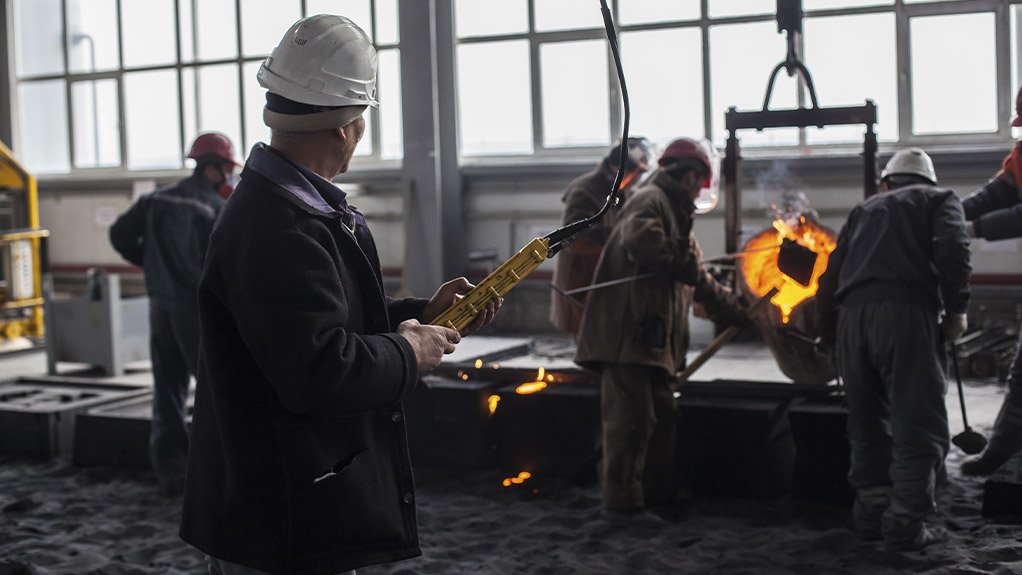Government’s intention to increase demand for locally manufactured content to at least 60% across industries will have a positive impact on the local casting, forging and machining sector, says nonprofit entity the Casting, Forging and Machining Cluster (CFMC) of South Africa project leader Steve Jardine.
There are sectors that are stronger and provide more work for the casting, forging and machining industry, while others are struggling, he points out.
Jardine highlights the automotive sector as a leading contributor to casting, forging and machining: “There’s a lot of excitement around the contribution of the automotive sector. If we have about eight or nine companies providing a lot of local content, as we currently do, then that’s an ideal start.”
However, he mentions that there is a need for more companies to become active in producing local content for automotive and other sectors, and for them to work together on platforms like the CFMC to increase innovation and to address the challenges.
While some foundries have struggled and gone out of business in the past year, there are ideal opportunities for other foundries to grow.
There are several industrialist supplier development programmes, such as in the local automotive industry, for example. This is usually in partnership with larger, multinational original-equipment manufacturers (OEMs) that intend to develop smaller foundries, explains Jardine.
Although there are opportunities in other sectors, he stresses the struggling state of, for example, the rail sector.
This struggle is perhaps most epitomised by local State-owned enterprise (SOE) the Passenger Rail Agency of South Africa neglecting the maintenance of old rail infrastructure, and preferring to import manufactured parts rather than using local content in previous years, states Jardine.
“We’ve struggled to understand inclinations from SOEs in previous years to import everything they need, rather than buy local products and equipment. Rail, as well as other sectors, such as energy, relied on local capacity that has been decimated over the years, but even more so last year, owing to imports.”
In contrast to the local bigger foundries, Jardine highlights that there have not been as many “casualties” in terms of smaller foundries that service the mining and general engineering sector, mainly because such foundries are surviving by running on short time and have diversified their business.
He also argues that there is an abundance of work opportunities for local foundries across sectors, as long as these foundries are competitive and have done the necessary business development work required.
While he emphasises that this is difficult in an industry in distress, he claims that interaction with the CFMC and other industry stakeholders is changing the priorities of local SOEs and it is hoped that they have been incentivised through designated local content regulations to buy castings and forgings.
Jardine highlights that the CFMC is in discussions with industry stakeholders in industries such as energy, mining and rail. This includes State-owned rail company Transnet, as well as larger OEMs.
He regards the local mining sector as a vital sector for growth: “The fact that legislation in the mining sector places a requirement of 60% local content for equipment, also provides opportunities for local foundries and forges. A lot of the foundries are particularly supplying wear parts, which includes drill bits and liners that are used in mills.”
Jardine says multinational equipment manufacturers are beginning to assume that Southern Africa is a good growth market, and are taking an interest in achieving the local content required: “These companies are starting to ask local foundries and forges what can be supplied, and at what costs. This will provide a boon to the industry when global companies start to buy local equipment and components.”
Meanwhile, he explains that, since its inception, the CFMC has put structures in place to enable engagements with government on issues to build horizontal supply chains.
“The CFMC is a special initiative created by the private sector, which is an important distinction because the structure of our organisation helps us in the way that we interact with industry and government. The cluster is a special development purpose vehicle, and will enable companies to work together to do things we couldn’t do individually.”
He asserts that several CFMC specialists are involved in stakeholder discussions in many different industries to create strategies to identify prospective local content.
Jardine stresses that building horizontal supply chains will help the local casting, forging and machining industry to innovate, increase productivity and find new ways to compete, negating the need to reinvest significant capital that is difficult to afford.
“For us to localise the kind of content that we want to, we’re going to need a lot of money to support the developmental process. Access to developmental capital has proven difficult and will definitely be an ongoing challenge. Everything will hinge around being prepared to meet current and future needs. Our aim is to develop business plans and cases, to guide the process,” he concludes.
Edited by: Zandile Mavuso
Creamer Media Senior Deputy Editor: Features
EMAIL THIS ARTICLE SAVE THIS ARTICLE
ARTICLE ENQUIRY
To subscribe email subscriptions@creamermedia.co.za or click here
To advertise email advertising@creamermedia.co.za or click here













